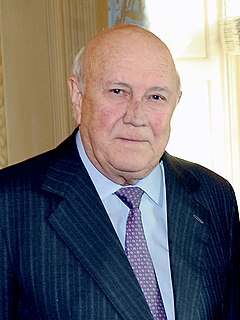
Frederik Willem de Klerk is a South African retired politician, who served as State President of South Africa from 1989 to 1994 and as Deputy President from 1994 to 1996. As South Africa's last head of state from the era of white-minority rule, he and his government dismantled the apartheid system and introduced universal suffrage. Ideologically a conservative and an economic liberal, he led the National Party from 1989 to 1997.

Winnie Madikizela-Mandela, also known as Winnie Mandela, was a South African anti-apartheid activist and politician, and the second wife of Nelson Mandela. She served as a Member of Parliament from 1994 to 2003, and from 2009 until her death, and was a deputy minister of arts and culture from 1994 to 1996. A member of the African National Congress (ANC) political party, she served on the ANC's National Executive Committee and headed its Women's League. Madikizela-Mandela was known to her supporters as the "Mother of the Nation".
46664 is a series of AIDS benefit concerts played in honour of Nelson Mandela by South African and foreign musicians between 2003 and 2008.

Long Walk to Freedom is an autobiography written by South African President Nelson Mandela, and first published in 1994 by Little Brown & Co. The book profiles his early life, coming of age, education and 27 years in prison. Under the apartheid government, Mandela was regarded as a terrorist and jailed on the infamous Robben Island for his role as a leader of the then-outlawed African National Congress (ANC). He later achieved international recognition for his leadership as president in rebuilding the country's once racist society. The last chapters of the book describe his political ascension, and his belief that the struggle still continued against apartheid in South Africa.

Daniel Isaac "Danny" Schechter was an American television producer, independent filmmaker, blogger, and media critic. He wrote and spoke about many issues including apartheid, civil rights, economics, foreign policy, journalistic control and ethics, and medicine. While attending the London School of Economics in the 1960s Schechter became an anti-apartheid activist and made trips to South Africa on behalf of the African National Congress (ANC). Later he would help musician Steven Van Zandt assemble other performers to form Artists United Against Apartheid who released the album Sun City in 1985. Schechter produced and directed six nonfiction films about Nelson Mandela from the time Mandela was a political prisoner to his election and service as President of South Africa.

Adelaide "Mama" Tambo was a prominent anti-apartheid activist, political exile, and regarded as a hero of the liberation struggle against apartheid in South Africa.
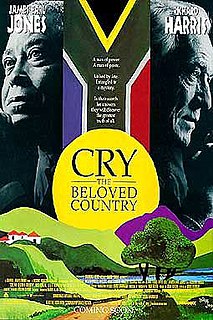
Cry, the Beloved Country is a 1995 South African-American drama film directed by Darrell Roodt, based on the novel Cry, the Beloved Country by Alan Paton. It stars James Earl Jones and Richard Harris.

John Carlin is a British journalist and author, who deals with both sports and politics. His book Playing the Enemy: Nelson Mandela and the Game that Made a Nation, about former South African president Nelson Mandela, is the basis for the 2009 film Invictus.

Nelson Rolihlahla Mandela was a South African anti-apartheid revolutionary, political leader and philanthropist who served as President of South Africa from 1994 to 1999. He was the country's first black head of state and the first elected in a fully representative democratic election. His government focused on dismantling the legacy of apartheid by tackling institutionalised racism and fostering racial reconciliation. Ideologically an African nationalist and socialist, he served as the president of the African National Congress (ANC) party from 1991 to 1997.
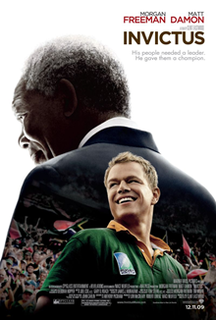
Invictus is a 2009 biographical sports drama film directed by Clint Eastwood and starring Morgan Freeman and Matt Damon. The story is based on the 2008 John Carlin book Playing the Enemy: Nelson Mandela and the Game That Made a Nation about the events in South Africa before and during the 1995 Rugby World Cup. The Springboks were not expected to perform well, the team having only recently returned to high-level international competition following the dismantling of apartheid—the country was hosting the World Cup, thus earning an automatic entry. Freeman and Damon play the South African President Nelson Mandela and François Pienaar, respectively. François was the captain of the South Africa rugby union team, the Springboks.
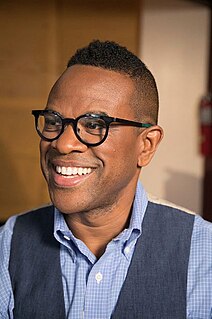
Thomas Allen Harris is a critically acclaimed, interdisciplinary artist who explores family, identity, and spirituality in a participatory practice. Since 1990, Harris has remixed archives from multiple origins throughout his work, challenging hierarchy within historical narratives through the use of pioneering documentary and research methodologies that center vernacular image and collaboration. He is currently working on a new television show, Family Pictures USA, which takes a radical look at neighborhoods and cities of the United States through the lens of family photographs, collaborative performances, and personal testimony sourced from their communities..
Have You Heard from Johannesburg is a series of seven documentary films, with a total runtime of 8.5 hours, covering the 45-year struggle of the global anti-apartheid movement against South Africa's apartheid system and its international supporters who considered them an ally in the Cold War. The combined films have an epic scope, spanning most of the globe over half a century. Beginning with the very first session of the United Nations, and ending in 1990 – when, after 27 years in prison, Nelson Mandela, the best known leader of the African National Congress toured the world, a free man. Produced and directed by Connie Field, it includes other events such as the Sharpeville massacre, the Soweto uprising, the murder of Steve Biko, and covers the role of some people less well known outside South Africa than Nelson Mandela, such as African National Congress leader Oliver Tambo. The title comes from the lyrics of the Gil Scott-Heron song "Johannesburg".
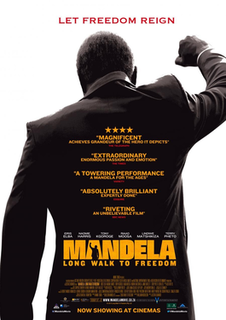
Mandela: Long Walk to Freedom is a 2013 British-South African biographical film directed by Justin Chadwick from a script written by William Nicholson and starring Idris Elba and Naomie Harris. The film is based on the 1995 autobiographical book Long Walk to Freedom by anti-apartheid revolutionary and former South African President Nelson Mandela.
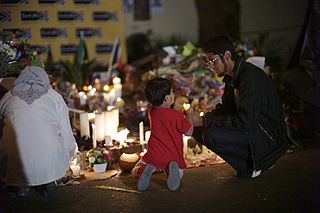
On 5 December 2013, Nelson Mandela, the first President of South Africa to be elected in a fully representative democratic election, as well as the country's first black head of state, died at the age of 95 after suffering from a prolonged respiratory infection. He died at around 20:50 local time (UTC+2) at his home in Houghton, Johannesburg, South Africa, surrounded by his family. His death was announced by then President Jacob Zuma. Reactions from governments, international organizations, and notable individuals, gained worldwide media coverage.
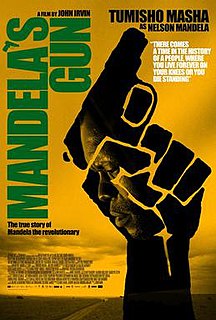
Mandela's Gun is a 2016 South African biographical film of Nelson Mandela's experience as a guerrilla fighter for the African National Congress. It was directed by John Irvin and shot in South Africa.
Dear Mandela is a 2012 South-African/American documentary focusing on three friends who are members of shackdwellers movement Abahlali baseMjondolo. They fight eviction by making a legal challenge against the KwaZulu-Natal Elimination and Prevention of Re-emergence of Slums Act of 2007 which ends up going to the final court of appeal, the Constitutional Court. The challenge is successful but also results in a violent attack on the Kennedy Road informal settlement in 2009. The film-makers were themselves caught up in the attack.
"Bring Him Back Home ", also known as "Bring Him Back Home", is an anthemic anti-apartheid protest song written by South African musician Hugh Masekela. It was released as the first track of his 1987 album Tomorrow. It was recorded in 1986 when Masekela was in exile from the apartheid regime of South Africa. The melody of the song is buoyant, containing a number of powerful chords and trumpet riffs. The lyrics of the song demand the release of Black South African leader Nelson Mandela, who had been imprisoned by the white South African government on Robben Island since 1962. The song became enormously popular, and turned into an unofficial anthem of the anti-apartheid movement. It became one of Masekela's most performed live songs. It was later used as a part of the official soundtrack to the documentary film Amandla!: A Revolution in Four-Part Harmony. The song was included in the 1994 live album Hope and in the 2001 collection Grazing in the Grass: The Best of Hugh Masekela, released by Columbia Records.
The Nelson Mandela Foundation is a non-profit organization founded by Nelson Mandela in 1999 to promote Mandela's vision of freedom and equality for all. The chairman is professor Njabulo Ndebele.
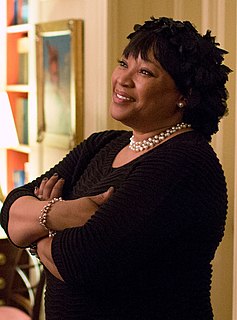
Zindziswa Mandela, also known as Zindzi Mandela-Hlongwane, was a South African diplomat and poet, and the daughter of anti-apartheid activists and politicians Nelson Mandela and Winnie Madikizela-Mandela. Zindzi was the youngest and third of Nelson Mandela's three daughters, including sister Zenani Mandela.













